-
LA MORT DE LOUIS XIV (Albert Serra 2016)
ALBERT SERRA: LA MORT DE LOUIS XIV/THE DEATH OF LOUIS XIV (2016)
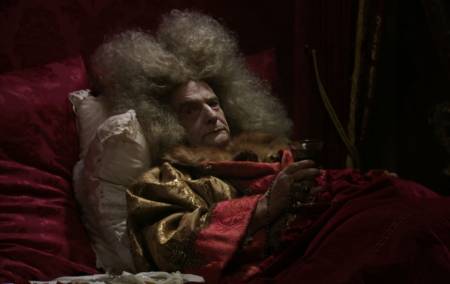
JEAN-PIERRE LÉAUD IN LA MORT DE LOUIS XIV
Léaud dies for us, with authoritative inertia
Serra is working in a similar style to his Casanova film (too much so!) but this time has something concentrated and at times grand - and he has Jean-Pierre Léaud, who if not the "only" person to play the dying king as he's claimed, is a hard choice to better. Being, if not quite near death, still rather worn down myself from lengthy visits to the Centre Pompidou Renée Magritte show, "The Color Line" at the Musée Branly, and the breathtaking but exhausting and mobbed Icônes de l'art moderne show of the Shchukin Collection at the Fondation Louis Vuitton in Frank Gehry's airy bubble palace, I'll refer my readers to the Critics Roundup for Serra's film for a mosaic of salient comments and just add a few of my own.
There, you will see excerpts from Jonathan Rosenbaum, who only hints at why he finds this "gripping" and calls Léaud's performance "exquisite" and "minimalist." "Hell man," Errol Flynn's last words are said to have been, "dyin's easy." And indeed it does not require much motion to die. The quintessentially cinematic Léaud knows to underplay it.
Josh Timmermann of Vancouver is also right: the film is largely about "wrong-headed doctors" and "syncophantic courtiers" - and, I might add, we have seen noble death sequences that emphasized these aspects in historical movies before. This is among other things a reminder of how far medicine has come since 1715. Maybe Leo Goldsmith is right, that Serra was disingenuous in denying the significance of casting Léaud: that his own physical decline is a part of what's moving. Cinephiles know him as the boy in The 400 Blows and the frisky Antoine Doinel. Here he is fat and degenerate-looking. Showing up is 80 percent of life, and Léaud is showing up as Léaud as well as donning the apparel of a dying king, arguably the greatest in history.
Note the comment of Daniel Fairfax in Senses of Cinema: "Very few actors are capable of holding our attention for 100 minutes of screen time while essentially remaining supine throughout the film. Léaud, one of the most captivating figures in the history of film, achieves this feat with ease. His very being is cinematic." Léaud indeed was always completely at home in front of a camera: he knows how just to "be." And dying's "easy" (in Flynn's dying words) because it's passive. This is what makes the experience of the film both grand and tragicomic. The king's accoutrements are noble - the cloths, the gilt, the big fuzzy wig, Léaud's now imposing schnazz, the team of doctors, courtiers, and servants; but his passivity and his predicament are sometimes humiliating, or even comic.
Technically, and economically, Serra makes the film intensely claustrophobic. Though he shows us the plotting, conniving entourage, he builds a series of relentless closeups and immobile shots echoing the king's own inability for most of the film to get out of bed.
Several writers refer to Roberto Rossellini's historical neorealist film for French TV The Taking of Power by Louis XIV, that bright and energetic, this dark and gloomy (and, like the Casanova film, seems embalmed in molasses, which makes this, despite what some critics say, not a film of mainstream as well as festival/cinephile appeal). But they have a kinship too, because Serra's approach verges on neorealism, a cinematic approach to history deep into physicality and uninterested in narrative or making "points." The accoutrements are nice, but the history you'll have to read up on for yourself. He also spares us many disgusting details, however, that a more conventional modern film might have included.
Whatever adjectives we apply to Serra's film, grand, strange, melancholy, elegant, it is a dark, moody, highly crafted yet experimental memento mori, a reminder that death is the great leveler. It is also, as the eternally hard-to-please Cahiers du Cinéma observes, "vaguely beautiful, but above all very boring"! Le Figaro calls Léaud's performance "fascinating and monotonous." It's a waxworks tour de force: for very long takes, in the final dying phase he just barely moves, then does not move at all. Watching kings die is thought-provoking, but it's also, at times, like the proverbial watching paint dry.
La mort de Louis XIV, 115 mins., debuted at Cannes. It won the Prix Jean Vigo 2016 (feature film) and at Cannes Jean-Pierre Léaud was given a Palme d'or d'honneur, a fitting recognition of the legendary actor whose performance here signals twilight years (he seems older than his actual 72); 14 other international festivals including Toronto, New York, Vancouver and London. French theatrical release 2 Nov. 2016 to extremely favorable reviews (AlloCiné press rating 3.9/5 based on 22 reviews), but note the negative comments I've cited. Screened for this review at MK2 Hautefeuille AKA Côté St-Michel, Paris, 3 Nov. 2016.
Last edited by Chris Knipp; 04-18-2017 at 07:24 PM.
-
BILLY LYNN'S LONG HALFTIME WALK (Ang Lee 2016)
ANG LEE: BILLY LYNN'S LONG HALFTIME WALK (2016)
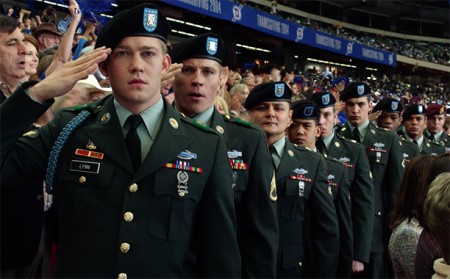
Acid trip at 120 frames?
Ang Lee's film adapted from the bestseller Billy Lynn's Long Halftime Walk was one of those later inspirations of the New York Film Festival, chosen after the Main Slate had been selected to be featured as a glitzy festival premiere. Lee's Life of Pi four years ago, a similar NYFF collaboration, was, similarly, technically innovative and a glitzy premiere. But that one was more successful, and made more sense in the first place.
Motion capture CGI of animals enabled Lee to film Yann Martel's unfilmable sea odyssey - that zoo-full of escaped animals, that saga on a lifeboat with a Bengal tiger could never have been visualized before this technology. Maybe Ang Lee's Life of Pi isn't deep, but it's a glorious adventure. This time Lee wanted to try out a different innovation, shooting at a zillion frames a minute (actually 120 fps) to achieve a hyperreal visual effect augmented with 4K and 3D. The trouble is that most movie theaters haven't the technology to project the film as it was made and shown at Lincoln Center. So it just looks like any other film, which may be for the best. Was this technical experiment necessary?
I like this film, mainly because I like the star, young English actor Joe Alwyn, who plays Billy. He tremendously holds the screen. I can also see what's going on in Ben Fountain's novel as adapted by Jean-Christophe Castelli, even though at the end, you go, "Is that all?" Something is missing - the deeper ironies, postmodern media savvy, and emotional complexities of the book. This lack remains, despite higher resolution and filming everything, the heroic Bravo squad's and Billy's long day as patriotic mascots at a big Texas Thanksgiving football game, as he, especially, flashes back to the war in Iraq they've just come from, and are soon going back to. All that can't make up for what doesn't get to the screen from the book.
Billy's heroic exploit, as it's seen (he says he's not a hero, just a soldier) where he tried to save his beloved guru and mentor 'Shroom (a sweet, philosophical Vin Diesel) in a fire fight, was filmed and the nation saw it, so Billy, who got a Silver Star, is famous. The Bravo group has been on a boozy, tacky victory tour for two weeks, and have just now come to Billy's home state of Texas, where his sister Kathryn (Kristen Stewart, excellent and totally unglamorous), only now recovering from a terrible car accident, who loves Billy and hates the war, wants him to use his special status to claim PTSD and get out of combat. And he considers this. He's also a virgin, and he falls for a classy, Christian cheerleader, Faison (Makenzie Leigh), who wants him. Meanwhile the squad is surrounded by handlers and the oily football team owner, Norm Oglesby (Steve Martin), and a movie deal is spoken of. All this is going on, and then comes the halftime show where the squad is on display with Billy in front.
Joe Alwyn is a physically impressive young man, and his big, boyish, almost babyish face, big blue eyes and big smile are riveting. The conceit of the story is that the halftime show, with its fireworks and explosions and loud drum rolls and being within two feet of a prancing singing Beyoncé, brings back that day of combat to Billy, not for the first time, but at higher intensity and greater length, down to his hand-to-hand killing of an Iraqi and him and his sergeant Dime (Garrett Hedlund) falling into each other's arms when they know 'Shroom is dead for sure.
The logic of the hyperreal imagery Lee worked for seems this. The boys wake up with a hangover that morning, particularly Billy, who asks for Advil all through, but gets it only after everything is over. They do some drinking, and they smoke some dope. Just civilian life, which now seems more chaotic than the front, but above all this overblown crazy outpouring of American kitsch, must seem to the squad, and to Billy, like an acid trip. The amped-up clarity of images was a way of expressing that - though unlike the motion capture CGI for the Bengal tiger, it wasn't really necessary, and reliance on the images, and recreation of the chaotic stadium scene and of scenes from the squad's Iraq experiences, down to the face of a boy when they take away his father in a night raid of a house - though all this is impressive and memorable, just may not have been quite what Ben Fountain was getting at in his book.
I haven't read the book, but I want to. It's been called "the Catch-22 of the Iraq war," and that's good enough for me. It's obviously a hard look at modern combat, the intimacy among soldiers, the morality of the "war on terror," heroism vs. doing your job, and the way America looks at war and at its soldiers. The latter, though central, is largely only implied in the movie. Tellingly, Billy says he can't understand why he is being celebrated for "the worst day of my life." Once again as so often happens with a film adaptation of a complex book, one feels deprived. I'm also not convinced the normally gentle and peaceful (and must I point out, Taiwanese, not American?) Ang Lee was the man to direct such a movie.
Yet many of the cast members are fine, starting with Alwyn, whose power to express Billy's gentle dignity goes beyond words, continuing with Garrett Hedlund in one of his best performances as the brisk, ironic but moral Dime; Kristen Stewart, so caring, yet so bitter, as Billy's sister; and each of the squad members, Arturo Castro as Mango, Mason Lee as Foo, Brian 'Astro' Bradley as Lodis, Beau Knapp as Crack, Ismael Cruz Cordova as Holiday, and Barney Harris as Sykes, strikes the right note, and their ensemble work evokes military camaraderie perfectly. Steve Martin seems a bit out of his depth, but it's Joe's movie. That face, and that smile, you swim into. His Billy is confused, at a loss - here - but always gives the right answer. You can believe this rude boy in his Texas youth has become a brave leader in combat. But again, I think Ben Fountain was saying more than that, and so this movie, for all its visual glamour, is a little shallow. Obviously Alwyn will be back, and I look forward to his two films being completed for release in 2017. (I've relied on Theo Tait's description of the book in his July 2012 Guardian review. I note that Todd VanDerWerff describes the original 120 fps 4K 3D version as a "gorgeous calamity." He suggests that maybe the one time where the hyperreal visuals he saw at Lincoln Center really click in the film is when, during the halftime show, Billy's perceptions suddenly morph back and forth from fireworks to firefight - when the acid trip effect shows us his PTSD in effect. And that could be. But most viewers will never see it.)
Billy Lynn's Long Halftime Walk, 113 mins., debuted 14 Oct at the NYFF. Screened for this review in regular 2D format at small cineplex auditorium in Emeryville, California 22 Nov. US release 11 Nov.; UK, 10 Jan. 2017.
Last edited by Chris Knipp; 11-23-2016 at 09:21 AM.
-
MANCHESTER BY THE SEA (Kenneth Lonergan 2016)
KENNETH LONERGAN: MANCHESTER BY THE SEA (2016)
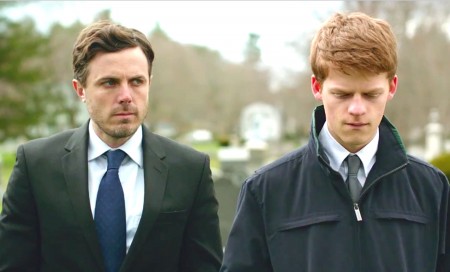
CASEY AFFLECK AND LUCAS HEDGES IN MANCHESTER BY THE SEA
Harrowing fun in New England winter
There is a lot of raw emotion in Kenneth Lonergan's Manchester by the Sea that makes it real and, by fits and starts, original. The material isn't new at all - a depressed ne'er-do-well given to barroom brawling, a teen who loses his dad, a couple split by tragedy - but the handling of it shows Lonergan's touch, and the acting is sometimes splendid, nearly always on the part of Casey Affleck, as the ne'er-do-well, and Lucas Hedges, as the bereaved teen, and theirs is the central relationship. There is a lot going on, but it all revolves around them. This is a complex and enjoyable film, despite its grimness; it's both flawed, and brilliant. It's a little too long, and some of the music is annoying. But it's splendid stuff, full of wonderful scenes and memorable small touches you want to watch again. Its high praise is deserved.
Lee Chandler (Affleck) is a janitor in a suburb of Boston. It is winter, and Massachusetts in winter is the setting for events. The film has a love affair with Essex County, the northeast corner of the state, boats and fishing, dry New England mindsets, and the accompanying snowy landscapes, which dp Jody Lee Lipes captures with a cool beauty in panoramic shots that punctuate the action. The film has a very keen sense of place, which always helps make emotion feel authentic.
The early part of the film is a grim, somewhat humorless comedy, Lee dealing with crabby tenants and their little problems. That is mere prologue, and he's soon back in his hometown (named in the title) dealing with the death of his older brother Joe (Kyle Chandler) from a premature case of congestive heart failure - then with being, without prior warning, made responsible for Patrick, Joe's now 16-year-old son (Lucas Hedges, who offhandedly nails his every line, and has some zingers).
As Lee's told this by the lawyer, the scene is intercut with an elaborate flashback exposition, a little over an hour into the film, of a tragedy that in a sense kills all suspense and lays out the facts too bluntly: when Lee says he can't move back here to care for Patrick, we may know why better than he could articulate.
The film is at once very funny and very sad. For the time being, though Lee fights the idea of being Patrick's custodian and of moving back, he is in charge of the boy, and it soon emerges that Patrick has more of a life than Uncle Lee. He's on the hockey team and another team (he's playing hockey, violently, when he gets the news of the death), he has two girlfriends, he's in a band. He is a darling of the ladies. He wants to keep his father's fishing boat, though the engine is giving out. He wants to finish high school with his friends; he has a lot of them. Lee is a maintenance man. Why should Patrick move to Boston? He also hates the idea that because it's a cold winter, his father's body is to be kept under refrigeration in Beverly, where the funeral home is, till spring when the ground is thawed and he can be buried in the cemetery in Manchester.
This is a story of responsibility thrust upon one unsuited to it, not unlike the subject of Lonergan's memorable debut film You Can Count on Me. Casey Afffleck shines as he embodies a terrible loser who yet has a lot of heart, whose aspiration to do the right thing takes on a quietly tragic dimension. Skirting on the edge are other memorably flawed individuals. Michelle Williams delivers a searing performance as Randi Chandler, Lee's ex-wife. There is a random encounter between Randi and Lee near the end that Mike D'Angelo says is so "emotionally harrowing and in such a radically unconventional way" that the prospect of "enduring" it a second time frightens him, even though he wants to watch the film again in hopes that the flashbacks, particularly of the tragedy, will make sense as more than mere exposition. These flashbacks in fact, though powerful, don't seem inserted with commanding logic. The late Joe Chandler's wife (Gretchen Mol) is a recovering alcoholic with a very Christian new husband (Matthew Broderick) and a shaky hold on normalcy and sobriety. She tries to come back into Patrick's life and he hopes this could be his safe haven.
Patrick uses pizza, his pals, and his two girlfriends innocent of each other's existence, whom he's trying to bed, with uneven success, to numb the pain of losing his exemplary father. He only breaks down once, memorably. That is one of many scenes where Lonergan wonderfully skirts the edge between raw and funny that characterizes some of life's most difficult moments. There is originality and intelligence in the focus on this edge, which makes us watch each scene with fresh eyes. Casey Affleck is from Massachusetts, and he has the quintessentially New England voice - dry but with a little break in it - that conveys depths of hurt under a tough facade with almost every line.
The movie doesn't end very satisfactorily. It takes us through a lot of very good stuff, and then offers a resolution that's almost an afterthought . But there is just a wealth of fine material here.
Manchester by the Sea, 137 mins., debuted at Sundance Jan. 2016; 17 other festivals, including Telluride, Toronto, New York, Vancouver and London. Theatrical release 18 Nov 2016. Screened on West Coast release 25 Nov. France 14 Dec., UK 13 Jan. 2017. An Amazon Studios Release. Ranking very high in ratings, Matacritc 96%, second only to Moonlight (99%).
Last edited by Chris Knipp; 11-23-2018 at 04:04 PM.
-
JACKIE (Pablo Larraín 2016)
PABLO LARRAÍN: JACKIE (2016)

NATALIE PORTMAN IN JACKIE
A glitzy simulacrum of great events
By bringing out two movies in one year, one in English with Hollywood stars, Chilean director Pablo Larraín shows his ambition - and he's overreaching. His Neruda is a surreal fantasy about his country's most famous literary figure, with Gael García Bernal, left over from his earlier No (where he first started to lose inspiration), running around as a dapper little detective. Jackie is a project that's equally ambitious - perhaps in global terms, more so. It 's about a major, shocking event in American history. It's also another Oscar bid for its star, Natalie Portman, who does an impersonation of Jacqueline Bouvier Kennedy, the look, the manner, the voice.
And yet nothing Larraín has done since has equaled the dark, creepy performances of the great Chilean actor Alfredo Castro and the director's admirably pessimistic second and third films, Tony Manero and Post Mortem. As the filmmaker's reputation has soared, the originality of his work has diminished. Jackie is a flashy effort, as audacious as it is accomplished. And yet, if you look closely, it is contains no revelations. Like many movies, it's essentially a play, with unusually beautiful and realistic visuals that do not add to the meaning.
It's a bold move on Larraín's part to switch to English with filming the Kennedy assassination and its aftermath from the point of view of Jacqueline Kennedy, and the look of the whole film glitters through the brilliant work of cinematographer Stéphane Fontaine, who worked with Jacques Audiard, with Matt Ross on Captain Fantastic, and recently on Verhoeven's Elle. In a sense the ghoulish, Madame Tussaud attention to detail fits will with Larraín's early films. The waxworks realism alternates with moments that are sometimes surreal, weaving together diverse scenes. Editing juggles back and forth between a flashback simulation - but all of this is simulation - of Mrs. Kennedy's hour-long black-and-white TV tour of the White House, seen as stilted and almost comically nervous; the moment of the shooting in the motorcade in Dallas, the blood-spattered pink Chanel suit that she refused to take off for the photographers ("I want them to see what they've done"); the hours between the autopsy and the funeral; a later meeting with an Irish Catholic priest (John Hurt); and, in an understandable but still probably pretty unwise (and awkwardly executed) frame tale of historian Theodore H. White's lengthy interview with the widow at Hyannis Port for Life magazine a week later. The bloody, explosive moment of the killing and the interment at Arlington National Cemetery are saved for the last minutes. If you consult White's notes of the actual interview, Mrs. Kennedy actually launced into gruesomely vivid detail of spattered blood in its first moments, but not in the film version.
But the revelation - that "Jackie" paid a lot of attention to how history would view her husband and the style of his departure, such as the Lincoln-style horse-drawn bier and the funeral procession on foot behind it, and the dramatic location of JFK's grave on an Arlington hill apart; and overall her desire that the Kennedy administration be seen as a kind of "Camelot" - just isn't a revelation at all, even though details of the White interview weren't revealed till a year after the death of Mrs. Onassis. It's just what everyone knows who has the slightest knowledge of the events. The movie saves for last "news" that lands with a thud.
What the movie does extraordinarily well is the trappings. The furniture, above all the upholstery, and all the decor of the White House and Hyannis Port look just right. The early-Sixties clothes of both the men and the women seem flawless, except for White's inappropriate loose tie for the interview (that would never have been). Larraín also recreates photographs of the Johnsons and Kennedys and the whole funeral, down to Caroline and John-John walking down the stairs with their mother.
Portman will be congratulated for her recreation of the First Lady's voice and accent. Unfortunately such efforts are doomed to failure. She can't get the lady's beauty, elegance, and inner calm, or the subtly concealed insecurity behind that facade.
The film justifies its focus by reflecting, as again we know who have followed these events, that Jacqueline Kennedy behaved with courage and authority under stress. The most impressive note is her anger. It's hard to know what the family will think of the montage in which she wanders the White House in a string of fancy outfits drunk and stoned on pills and listening to the "Camelot" record, or how much the real Jacqueline cried or didn't cry. It's impossible not to link this performance by Natalie Portman with her Oscar-winning turn in Darren Aronofsky's over-the-top psychological thriller Black Swan. The connectioin explains why Portman seems to be trying too hard at many points. She was not, like her subject, to the manner born. She does a plucky job. She's literally not big enough for the role.
Jackie is a glitzy cinematic bauble. It gets right so many of the things a movie can get right about a time and place. But its revelations are empty. And whether or not Natalie Portman pulls it off, other actors are at best approximate. Peter Sarsgaard isn't right at all as Bobby Kennedy. Greta Gerwig is so well disguised it hardly matters, though she's an odd choce for social secretary Nancy Tuckerman. John Carroll Lynch looks more like a thug than Lyndon Johnson, Beth Grant is barely close Lady Bird Johnson. Billy Crudup isn't even billed as Theodore H. White, only "The Journalist," but his character is too bold and aggressive. So it goes. This is a simulacrum whose accuracies only show up how far off it is from the real thing. Maybe next time Larraín will do something lower key and more authentic. He has our attention.
Jackie, 99 mins., debuted at Venice 7 Sept. 2016; 14 other festivals including Toronto and New York. US Theatrical release beginning 2 Dec. UK 20 Jan. 2017. Metacritic rating 80%.
Last edited by Chris Knipp; 12-11-2016 at 07:23 PM.
-
PATERSON (Jim Jarmusch 2016)
JIM JARMUSCH: PATERSON (2016)
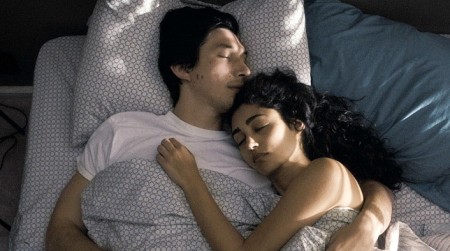
ADAM DRIVER AND GOLDSHIFTEH FARAHANI IN PATERSON
Magic of the quotidian
Paterson both is and isn't a typical Jim Jarmusch film. It has little touches that are distinctively his. His hermetic onscreen world, infuriating to some, is present here, notable in the controlled environment and repetitive structure. But this isn't a wry comedy with a hipster angle. It has its little running jokes, but on the whole it's deadpan. It's more like a little study in the nature of everyday life. It's humble. It's rather zen. It's organized into chapters, each one a day, chronicling a week or so in its characters' lives. It's a quiet tale of life and art, and also most certainly of love. Like most movies where nothing happens, it's hard to describe. It has hardly any big incidents (maybe two medium ones, one of which is, admittedly, a shocker), but there is a multiplicity of small ones. What they add up to is revelation and quiet pleasure.
Its protagonist is a modest man, a humble working-class guy. But he's a quiet giant. He may have the answers, but he would not boast of that. And he's a poet, of sorts. Every day he adds to the little fund of free verses he has penned into "secret notebook" he takes with him to work. He is a bus driver (played by Adam Driver). His name is Paterson. To make it simpler (and more hermetic, more like a poem) he also lives in Paterson (New Jersey), the home of the notable American poet, William Carlos Williams, who wrote a long poem, published over time in five volumes, called Paterson. (Allen Ginsberg also came from Paterson.) On the front of the bus he drives the destination reads simply, "Paterson."
Paterson has a live-in girlfriend, Laura. Laura and Paterson are in love. When he wakes up beside her every work day at a little past six he looks at her lovingly, kisses her, and they exchange sweet words. Laura is played by the beautiful, multi-lingual actress, Golshifteh Farahani (who's already delivered impeccable performances in Farsi-, French-, and English-language films). As Laura discovers, the Italian poet Petrarch, who perfected the sonnet, wrote a famous poem sequence dedicated to a beloved named "Laura." She thinks Paterson is a fine poet, and she wants him at least to copy the poems, which exist now only in his notebook.
Paterson's Laura is a creative homebody, in the house most days with Marvin, their English bulldog. When he comes home from work Paterson takes Marvin for a walk, in the course of which he tethers Marvin and stops at a bar whose black owner (Barry Shabaka Henley) is named Doc. At the bar he drinks a beer and talks of this and that with Doc and the occasional customer. We learn, for instance, that the most famous citizen of Paterson was the comic Lou Costello (of Abbot and), and there's a park named after him there. Paterson also has a waterfall, and Paterson and Laura have a little picture of it on their wall.
Every day at work Paterson sees Donny (Rizwan Manji), an Indian-born colleague who has lots of complaints. When he asks Paterson how he is, Adam invariably answers, "I'm okay." On the bus, he overhears conversations among passengers, including a young couple who consider themselves the only anarchists in the town. When Paterson gets home, carrying his lunch pail, he pulls the mail out of the mailbox. It's always tilted askew on its pike, and he straightens it. One of the best visual jokes is connected with this.
Laura loves black and white, and has painted and decorated the house with circular designs in those colors. She has two big (for her) projects that develop during the week. One is baking cupcakes for a farmers market on Saturday. They are decorated in different circular patterns of black on white. The other is to become a country singer. This requires her to send away for a guitar and DVDs of guitar lessons. The guitar is called the Harlequin. It's decorated in black and white. When they go to a movie, it's black and white - The Island of Doctor Moreau, with Charles Laughton. (Jarmusch's classic early films were also, of course, black and white.)
But all these details are banalities - except perhaps Paterson's poems: but they too tend to the banal. They're in flat, ordinary language, and they chronicle the quotidian. But they are written by a real poet, Ron Padgett, 74, a poet of the New York school, referred to in the movie (they also resemble those of William Carlos Williams). As Paterson composes them in his mind and writes them down in his notebook, the text appears across the screen.
Toward the end, Paterson suffers a setback, but he moves forward.
Essential to the success of this film is the performance of Adam Driver in the lead. Recently Driver has emerged as an actor of note: The NYFF devoted "An Evening With. . ." to him, as to Kristen Stewart, also much noted of late (she was in three 2016 NYFF films). Driver was in the Lena Dunham series "Girls" from 2012 and has been in films by the Coens, Noah Baumbach, and Jeff Nichols. Currently he is also in Scorsese's Silence beside Andrew Garfield, and he's in "Star Wars." His odd gawky face, tall, broad-shouldered body, deep voice help underline an openness and appeal that have never been better displayed before Paterson where he achieves an understated purity that is most appealing and, one might say, instructive.
The effect of Paterson is, and is intended to be, to celebrate the poetry of everyday life, focused in Paterson and Laura's love for each other, and their happiness with their ordinary days. Its repetition of days is like a series of stanzas and refrains. The film itself is a poem, and in its repetitiousness and bold simplicity Jarmusch has achieved something beautiful. At the time of its Cannes Competition showing, the Nouvelle Observateur critic Pascal Merigeau called it "an absolute marvel."
Paterson, 118 mins., debuted at Cannes 2016, to acclaim, and shown at at least 26 other international festivals including Toronto, New York, Mill Valley and London. US theatrical release began 28 Dec. 2016. Its current Metacritic rating is 90%. Screened for this review on its opening day in San Francisco at the Landmark Embarcadero Cinemas, 6 Jan. 2017.
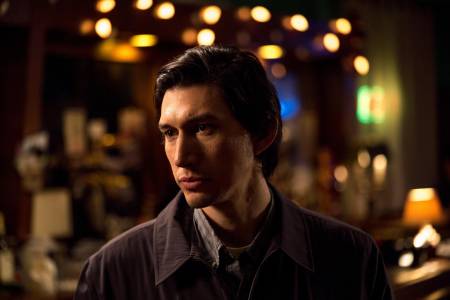
ADAM DRIVER IN PATERSON
Last edited by Chris Knipp; 01-08-2017 at 01:42 AM.
-
THE REHEARSAL (Alison Maclean 2016)
ALISON MACLEAN: THE REHEARSAL (2016)
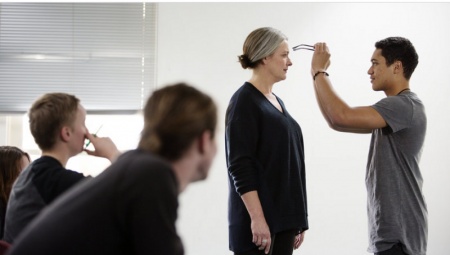
KERRY FOX, JAMES ROLLESTON IN THE REHEARSAL
Playacting too close to real
The Rehearsal is Alison Maclean's long-delayed sequel to her 1999 debut Jesus' Son. While that adapted Denis Johnson's linked story collection, this one is a free screen version of Mann Booker winner Eleanor Catton’s technically playful debut novel. The story about an Aukland acting "Institute" and its untoward interactions with a neighborhood scandal is a slow-burning ensemble piece. It has an admirably fresh and unpredictable quality.
Students at the Institute most work through the year to create and stage a joint end-of-term production that can not only blow away their demanding lead teacher Hannah (Kerry Fox of Shallow Grave, Bright Star) as drama but impress her and visiting talent scouts with participant students' individual skills. Likewise this ensemble movie impresses as a study of local society and a school, but highlights a few main characters, chiefly Hannah, with her Method brainwashing and tough love, and one student she likes, soft, coffee-colored eye candy Stanley (James Rolleston, who's already starred in three films, Boy, The Dark Horse, and The Dead Lands). Stanley is a handsome (or more accurately pretty) young Maori-heritage (in the story would-be) actor.
The Rehearsal is an intriguing mix of emotional and cool, like an actor who can engage an audience without personally losing it - perhaps like Stanley. It resembles a classier version of "Fame," but is unusual not only in its clear-headed look into how acting works but in being a New Zealand film whose offhand complexity has found it a place in some of the biggest international film festivals.
During early class exercises Stanlay comes off as hopelessly bland and without feeling, unable to access emotion or theatrical effects. But he turns out to be quite otherwise. It's a growing surprise when Stanley does show talent and access emotion - initially through channeling his macho dad in a class improvisation where he tells a dirty joke and comes on to Hannah. She likes.
In contrast when his mercurial housemate and pal William (Kieran Charnock) just tells a jokey family story to the class about a spoiled lamb roast that avoids real emotional revelation, Hannah creams him and he's devastated. Basic lesson: if you can't access deep feeling or aren't strong enough to be vulnerable, maybe you can't be an actor at all. Or maybe arts schools profs should be more careful about crushing young artistic spirits.
So that's one of a number of angles. Another, a key focus, is the term-end project. For it. Stanley gets the idea early on of depicting a tennis instructor who seduces his 15-year-old student Victoria (Rachel Roberts), a new local scandal. What he holds off revealing to the class or to her, is that he knows the story first hand, because he's dating Isolde (Ella Edward) Victoria's slightly older sister whom he met on a bus when coming to town. And come to think of it, Isolde is underage to Stanley, so he may be no better than the tennis coach. The story plays with a lot of these angles, delving into group sexual and teen personal issues and jumping around in a somewhat experimental way. And, if it seems too scattered it does end up with a great final musical segment.
The Rehearsal, 102 mins., debuted July (NZIFF), Aug. Sept., and Oct. in subsequent festivals including Toronto, New York, and London.
Last edited by Chris Knipp; 01-10-2017 at 03:40 PM.
-
20TH CENTURY WOMEN (Mike Mills 2016)
MIKE MILLS: 20TH CENTURY WOMEN (2016)
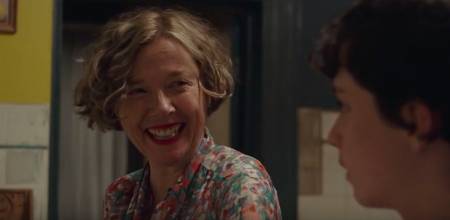
ANNETTE BENNING AND LUCAS JADE ZUMANN IN 20TH CENTURY WOMEN
"Now it's 1979 and nothing means anything"
With time off in 2007 for a documentary about depression in Japan, Mike Mills has now made three coming-of-age films. First came Thumbsucker (2005), adapted from a novel by Walter Kirn. Beginners (2010) focused on his father; the son is 38. 20th Century Women turns to his mother, and takes place a good twenty years earlier in the main character's life.
It may be that my favorite is Thumbsucker, but 20th Century Women goes down easier than its predecessor. Beginners had a depressed, aimless 38-year-old main character who was constantly upstaged by flashbacks to the short happy gay life of his father, who came out as a homosexual late in life, had a ball for a few years, then died of cancer. This time it's Mom - Dorothea, who's the center of the boy's world. He's called Jamie (Lucas Jade Zumann), and he's only 15. Dorothea, played by the wonderful Annette Benning, is 55. It's 1979. She's going to kick off in 20 years from cancer, from all the smoking she does. The movie keeps priming us with dates, ages and age-spans. They take the place of an aggressive sense of period and dramatize the filmmaker's sense of his own relationship to the times he's describing. It also may help make up for the lack of a story line. The protagonist in both movies is a slow developer - maybe because he doesn't do much of anything.
Dorothea was born in the twenties; she grew up in the Depression, when people helped each other, Jamie repeatedly says. They live in a large old house in Santa Barbara in need of many repairs. William (Billy Crudup), a hippie mechanic and handyman (as well as serial seducer), rents one of the rooms, and pays partly with carpentry. Another lodger is Abbie (Greta Gerwig), a punkish photographer. Also on hand, because it's the Seventies, and this is a loose, undefinable menage, is Jamie’s best friend, Julie (Elle Fanning), who frequently climbs in the window of Jamie's room, and sleeps - really sleeps - with him. Sex will spoil the friendship, she says. Later, he says he can fix that. But do they have sex?
There is, anyway, plenty of talk of sex, and also of music. Because somebody - I guess Abbie - likes The Talking Heads, outsiders paint "Art Fag" on one side of Dorothea's "new" VW Bug (replacing her ex-husband's Ford Galaxy, which caught fire in a parking lot) and "Black Flag" (a southern California punk band of the time) on the other. Home pregnancy tests are in their infancy, so to speak. Jamie helps Julie take one; she sleeps around. William just falls into sex, and does so with Abbie, for a while.
Since she grew up in the Depression, when people helped each other, Dorothea enlists Abbie and Julie (who's a couple years older and a lot wiser, maybe, than Jamie) to clue Jamie in to things, in lieu of "man" talk, which she thinks not necessary. For Abbie, this means cluing him in to feminism, and she gives him copies of Our Bodies, Ourselves and Sisterhood Is Powerful: An Anthology of Writings from the Women’s Liberation Movement, and he does take to these, and seems to thrive on them. It's all this mood that leads to a discussion of clitoral orgasm at the dinner table when guests are present.
Being from another era Dorothea sometimes objects, but she's also firmly independent and tries to be open - while admitting at times that her life has turned out to be flatter than she wants Jamie's to be. He thinks she accepts being lonely.
These situations are much dwelt upon, and not unenjoyably. But not so very much happens. The movie is punctuated by little jokes, like the far-fetched excuses Jamie turns in for cutting school; working for the Sandinistas and being in a small plane accident are examples. Music happens. There's a record player. And everybody goes out to hear a punk band. Jamie runs off one time up the coast with Julie, taking the VW (it still has the graffiti on it), and then he disappears - temporarily. To deal with this crisis, Dorothea drives up with Jamie and Abbie, in Jamie's rebuilt 1949 Chevy. Jamie always has his skateboard. You rarely see him riding it. He's too busy talking to these ladies. Once he lectures another boy on clitoral orgasm. Bad idea. He gets beaten up.
There is fear of aimlessness or a life unfulfilled but this time there is no depression. And - this is pleasant - everyone is nice. There are no tantrums, there's no violence. Mills has kept the cuteness and tweeness down more than last time - less influence of his wife Miranda July, though he has admitted he's still trying to impress her. There are just the constant voiceover warnings and explanations of what's going on, and what's to come. Dorothea tells Abbie she will get to see Jamie out in the world; she never will. Is this because she will always be his mother? Some of Mills' wisdom is elusive. Why, one wonders in retrospect, is there no mention of Jamie's father - if he was somewhere around, and would become central in a decade or so?
The present action ends with Jimmy Carter's inexplicable "Crisis of Confidence" speech, listened to by a big group. That's the end of him, someone says. The greatest thing about the times distantly referenced is how little they impinge on the rambling, crumbling house in Santa Barbara, allowing Dorothea, Jamie, Abbie, William, and Julie to talk to each other, and to us.
The life lessons, voice-over, are frequently banal. "So Sweetie, I don't know if we ever figure our lives out. And. . the people who help you - they might not be who you thought . . . or wanted." More showing and less telling, please.
It's obvious to say this is Annette Benning's film, and it is. But she gets first rate support. Greta Gerwig avoids any of her former mannerisms, and with her cropped hair "dyed in blood" (as Lane put it in The New Yorker) looks different from before too. Elle Fanning and Billy Crudup are good. Young newcomer Lucas Jade Zumann makes it all look easy. He is fun to watch. But no more fun than Annette. Mills still jazzes things up too much here, again; Lane points out the unnecessary visuals, the jittery speeded-up footage, the cars on the Pacific Coast Highway processed into a chromatic blur. But not as much as before, and these people are easier to take than last time.
20th Century Women, 118 mins., debuted 8 Oct. at New York, half a dozen other festivals, mostly domestic, limited US release 28 Dec. 2016. Wider US release 20 Jan. 2017.
Last edited by Chris Knipp; 01-15-2017 at 01:40 AM.
-
PEDRO ALMODÓVAR: JULIETA (2016)
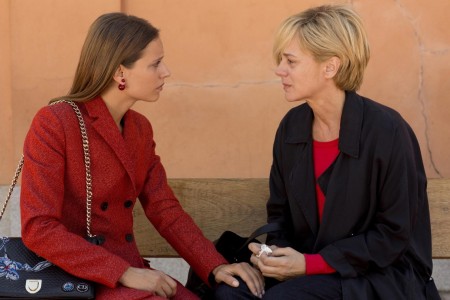
MICHELLE JENNER AND EMMA SUÁREZ IN JULIETA
A sense of loss
This adaptation of three linked stories by Canadian author Alice Monro was to have been made in America; it began as one of Almodóvar's temptations to come to Hollywood. He was going to shift the action from Canada to Massachusetts. Juliet, the woman protagonist, was going to live in Boston, and when she moved in with her fisherman lover, Eric, it was going to be on the coast of Maine. Meryl Streep was going to play Juliet. Then he switched to New York; then he gave up all notion of a movie in English, and made an Almodóvar film. But we may ask if even with jazzed up, more Mediterranean, action, glorious red-dominant scenes, and a marginally more hopeful ending, Almodóvar has not wound up with something a little too phlegmatic for his sensibility. True, in this "fourth" phase, he has been moving - sometimes: not in his over-the-top last film I'm So Excited - toward flatter, more solemn and serious movies, without the gay abandon and giddy vulgarity of earlier work. Nonetheless Alice Munro seems a peculiar fit for him.
This is a frame tale with flashbacks. Everything is bright and clear - yet puzzles may remain. At the outset Julieta (in middle age played by an excellent Emma Suárez) meets Bea (Michelle Jenner), the erstwhile best friend of her daughter Antía (successively played by Ariadna Matin, Priscilla Delgado and Blanca Parés), who later we learn she hasn't seen since she was 18. Bea has run into her at Lake Como. Julieta was on the point of moving to Portugal with her partner, Lorenzo (Dario Grandinetti). Now, since through Bea Antía knows she's still in Madrid, Julieta gives up that plan, lets Lorenzo move to Portugal on his own, and moves by herself into an apartment - with hideous wallpaper - in the building where she raised Antía originally. Julieta had given up a prolonged search for Antía , and in fact moved away from anything that reminded her of her lost daughter.
In the ugly flat, Julieta writes letters to her daughter, and we get flashbacks that sort of fill us in. There is the Hitchcockian meeting on the train with the hunky, sensitive fisherman from Galicia, Xoan (Daniel Grao). (We don't actually see him do anything so messy as catch fish.) A tragic event has happened on the train, but Julieta (played young by the strikingly pretty Adriana Ugarte) and Xoan make passionate love and Antía is conceived. (In the Munro story, Juliet was having her period and they only kiss.) Xoan is married, but his wife doesn't understand him, not surprisingly, since she's in a coma. Julieta comes to visit Xoan conveniently at the time of his wife's funeral. His housekeeper Marian (Almodovar regular Rossy de Palma with a fake milky eye and an ugly Afro wig) isn't very friendly; later she will be, though the relentless storytelling pace doesn't fit in an explanation. Also woven into the busy storytelling is Xoan's "friend" Ava (Inma Cuesta), an artist who makes the little heavy terra cotta covered bronzes with tubular penises (actually by Miquel Navarro) that Almodóvar himself likes to collect. Ava, like other characters, is somewhat inexplicably taken away from us, in her case by a debilitating illness.
In fact the tragedy that happens isn't very affecting either, but it's caused by a terrible storm. There is an interlude about Julieta's parents (Susi Sanchez and Joaquin Notario), and about teen girlfriends Antia and Bea. We see them flitting about, but their relationship, and personalities, aren't much developed. Why Antía disappears - chooses not to return from the three-month spiritual retreat she goes on, which perhaps is a brainwashing session, the work of a cult - remains a mystery until near the end, where there is a reference to Patricia Highsmith (whose first book Strangers on a Train was of course adapted superbly by Hitchcock) - and a theme out of Highsmith's book that became Haynes' Carol.
While diehard fans may indeed find this "fourth phase" Almodóvar too flat, the problem may be more that it's hard to get your head around the three interlocking stories; that Almodovar's adaptation hasn't given them enough harmony or enough subordination. The plot, with its diverging directions and sudden shocks, is both confusing and uninvolving.
Of course there is craft to enjoy. In the early scenes especially, the Almodóvar painterly visual style is much in evidence, and a delight to the eyes, Anton Gomez’s production design and delightfully gaudy color, with a predominance of red; and Jean Claude Larrieu's pleasingly bright and clear cinematography - though Almodóvar had to shoot in digital and not film this time, which he didn't like, as D.T. Max tells in his recent profile in The New Yorker. Sometimes even in my favorite Almodóvar films, like Talk to Her, I just like to escape into the colors, and ignore the action. As others have noted, Almodóvar does something interesting here: he presents a melodrama as if it were a thriller - an effect especially augmented by the train sequence and by the girl's disappearance. (A character in Tie Me Up! Tie Me Down! comments it's hard to tell a love story from a horror story sometimes.) He also presents some striking images, such as Julieta's heart beating under a fabric, and the stag running alongside the train framed by the window, seen by Julieta and a man who is to commit suicide. But in the end this movie seems not so much a thriller as a soap opera - with glamorous settings and high production values.
Underdeveloped here, from Munro's stories, is the role of faith, which Juliet denies, and her daughter goes in search of. That may be the key to the whole thing. There's a lot here in Almodóvar's movie, but it's not enough. I walked out of Julieta feeling unfulfilled. Obviously one should read the three stories, "Chance," "Soon" and "Silence" by Alice Munro, to understand the film's ending, as other writers have suggested.
Julieta, 99 mins., debuted at Cannes May 2016; nearly two dozen other international festivals including Toronto, New York, London. Mill Valley, and Palm Springs. US theatrical release starting 21 Dec. 2016.
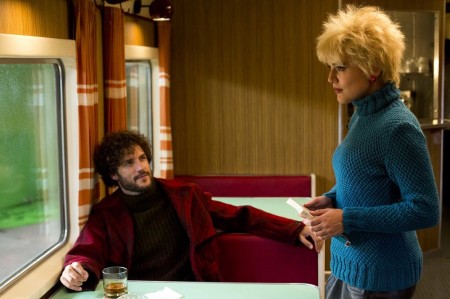
DANIEL GRAO AND ADRIANA UGARTE IN JULIETA
Last edited by Chris Knipp; 01-16-2017 at 12:35 AM.
-
PERSONAL SHOPPER (OlivierAssayas 2016)
OLIVIER ASSAYAS: PERSONAL SHOPPER (2016)
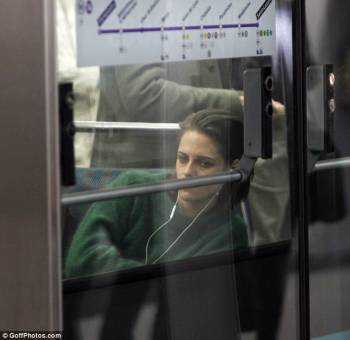
Fashion and ghosts
Personal Shopper is an elegant ghost movie starring one of today's coolest actresses, Kristen Stewart. She played Juliette Binoche's assistant in Olivier Assayas' previous Clouds of Sils Maria. Assayas liked her so much he made this whole movie as a vehicle for her. She has a complicated double role that she wears like an old shoe. And while she dresses up in super-expensive finery at one point, she doesn't dress up for her part; it's an old T shirt and jacket and stylishly disheveled hair, a pout and a face full of care that never dents her severe beauty. Her character, Maureen Cartwright, is a personal shopper for a rich celebrity, too busy and too famous to buy her own clothes and accoutrements. But Maureen has another "job": she's also a medium seeking closure with the spirit of her recently deceased brother Lewis.
Maureen isn't having it easy. The encounters with the ectoplasm and signs of Lewis are disturbing and sad, of course. She also hates her job for Kyra (Nora von Waldstätten), her pouty celebrity boss, whom she never sees, and doesn't want to. But Stewart makes it look cool and fun, as much at ease on a motorcycle tooling around Paris as riding the EuroStar to and from London or picking up jewelry at Cartier or dresses and shoes from posh boutiques. This is a life that's vicariously fascinating, in the classic manner of the movies. You might not really want to be her and she doesn't want to be doing what she's doing now, but it's still fun to imagine being her for these few important, fraught moments.
Personal Shopper is a ghost movie, but its milieu is so knowing and chic it avoids any feel of genre. This will displease fans of the genre as much as it makes palatable a topic some of us aren't normally all that much interested in. It may be a tossup whether you prefer Maureen as a personal shopper or as a medium communicating uneasily with Lewis. There was a lot of talking on cell phones in Sils Maria, but this time it's all texting, and the movie's real tour-de-force and most enjoyable passage is a trip to and from London on the Eurostar during which Maureen is constantly in SMS communication with an Unknown Caller who knows all about her, and about Lewis, and who prods her to take on what she fears most. The Unknown Caller texting Maureen is ectoplasm on the line. What will it want to know next? Where will this conversation go? Stewart performs the trip as routine; she never drops a line. Nor does Assayas, whose fluid filmmaking is a pleasure to watch.
Ghosts inhabit places and central to the piece is an old elegant house that Lara (Sigrid Bouaziz), Lewis' girlfriend, is now selling. Lara already has a new boyfriend - which is okay, Maureen is cool with moving forward, not into drawn-out grieving. And - another cool move by Assayas - the new boyfriend, Erwin, is played by Anders Danielsen Lie, the star of two of the best films of the last decade, Joachim Trier's Reprise and his Oslo, August 31st.
There is another kind of ectoplasm, Maureen's blurry Skype boyfriend Gary (Ty Olwin), an IT expert setting up programs in Muscat. Again the movie is cool: we're always getting Dubai thrust down our throats but it's Oman that's the sweet, still human part of the Gulf. After a big shock, Maureen goes to see Gary, who's taking a break in a quiet spartan retreat some way by chauffeured car from the town of Muscat. As usual, Maureen doesn't see the person she's come for. Gary has left a note. But she sees something else. And then, white-out.
Obviously this movie enjoyably plays around with the fringes of chic. It's a fringe movie. But that's what makes it fresh and subtle. It may not please everyone; what does? But it was far more enjoyable than I'd been led to expect from reports since Cannes, where it got booed. It's fun. Enjoy it.
Personal Shopper, 105 mina., debuted in Competition at Cannes May 2016; it was in many other festivals, including New York. French release 14 Dec. 2016: French reviews somewhat lukewarm (AlloCiné press rating 3.1); Metacritic rating 68%. US theatrical release 10 Mar. 2017.
Last edited by Chris Knipp; 03-03-2017 at 06:20 AM.
-
A QUIET PASSION (Terence Davies 2016)
TERENCE DAVIES: A QUIET PASSION (2016)
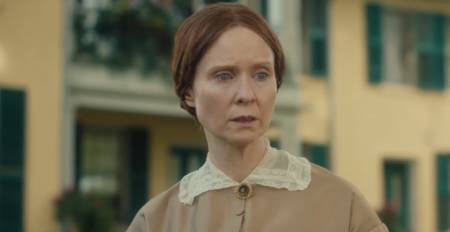
CYNTHIA NIXON IN A QUIE PASSION
A poet's life of drear
Emily Dickinson's "pithy haiku's," as a review of this new film calls her poems, are not meant to be read quickly in voiceovers as one is distracted by images, but to be pondered and repeated, to look at phrases from them and turn them around. Terrence Davies' repeated use of the voiceovers shows an unawareness of their complexity. Nor is this film the way to get at her or her life. It is a stilted, stifling film, and after seeing Cynthia Nixon's remarkable performance as the dying mother in James Wright, one can't help suspecting she was half chosen here for her skill at suffering and dying. (The film seems to assume she suffered from painful kidney ailments, though that's now doubted as a cause of death; it's just what was on her birth certificate.) Nixon hasn't quite got the apartness and wisdom of the gnomic, extraordinary writer who was after her death discovered to be perhaps America's greatest nineteenth-century poet, along with Walt Whitman (they make such wonderful compliments, he loose and expansive, she reclusive and tight-lipped).
The trouble is, Emily Dickinson's life was lived in her letters, her stifled romances, and her dawn writing sessions. Anything else, and this movie gives us a lot else, is a distraction from the Emily Dickinson who really matters. Despite its poshness (the Dickinsons were well-off, important people in Western Massachusetts, Amherst and beyond), Emily had a shitty life on the outside. The real life was on the inside. The movie gives us so much more of the outside than the inside, Davies might have left off the inside altogether and just said, at the end, "Oh and by the way, she was also a great poet."
Davies takes pains (this is all nothing if not painstaking) to tell us about those dawn poetry writing sessions formally approved by her father, and one of the best scenes is when her new sister-in-law Susan Gilbert (Jodhi May), her brother Austin's wife, comes upon her before dawn wrapped in a big shawl writing poetry, and they have a "quietly passionate" chat. They're going to be next door neighbors now, and weep with emotion over it. Emily calls herself "a no-hoper." She says all she has is "routine." But they smile and laugh thinking of how they'll share the Brontes, George Eliot,and "even Mrs. Gaskell." Here we glimpse the deprivations and also the consolations of Emily's life. The best scenes are the ones that do that, mixing glee and irony. Too much of the time Davies merely wallows in gloom, as the Reverend Wadsworth's chilly wife thinks the Bronte sisters do. What a great discovery antidepressants are! They'd have made nineteenth-century New England so different.
There are moments, but the complexity of Emily's life is hard to grasp in Davies' routine scenes of the family life - rolled out in succession like theatrical vignettes: her "rescue" by the family from the future Mount Holyoke College after only one year; her lively woman friend Vryling Buffam (Catherine Bailey), who shares girls-against-the-world stands, then takes a conventional husband; the cataclysm of the Civil War, which Emily's father Edward Dickinson (Keith Carradine) would not let her brother Austin (the odd-looking Duncan Duff) go off to fight i; her growing reclusiveness and unwillingness even to face people. These are just outward trappings of the inner life that was central and continually rich, as we know from the poems. We haven't seen any movies about the life of Jane Austin. There's a reason. If there were any, one would hope they'd be made in Hampshire, where she lived. A quiet Passion was mostly filmed in Belgium and a lot of the cast is British.
Davies has had a recent spurt of creativity, four films in eight years, with nothing in the previous eight. It's been uneven. Of Time and the City was a rambling but touching memoir of his birthplace, Liverpool. The Deep Blue Sea was a lovely sad swoon. Sunset Song was an epic bore. It made no sense and even the dialect was incomprehensible. Now comes this curious, misguided effort, a relentlessly unfun movie in which Davies is out of his element and takes Emily Dickinson out of hers. She was succinct; he goes on for over two hours rubbing in the drear, devoting the last half hour to the final illness that was only two and a half of her 55 years, seven months in bed. As noted, Cynthia Nixon is an actress expert at dying. But see her in James Wright: she dies more quickly, and it's a better movie: instead of besmirching the reputation of a great poet, it gives hope for the redemption of a dissolute young man.
A Qiuiet Passion, 125 mins., debuted at the Berlinale FEb. 2016; 19 other international festivals including Toronto, New York, and London. UK theatrical release 7 Apr. 2017, US, 14 Apr. 2017.
-
MY ENTIRE HIGH SCHOOL SINKING INTO THE SEA (Dash Shaw 2016)
DASH SHAW: MY ENTIRE HIGH SCHOOL SINKING INTO THE SEA (2016)

"If 'Freaks and Geeks' met 'The Poseidon Adventure'" (blurb)
This is the first animated feature to be included in the Main Slate of the New York Film Festival since 2008's Waltz With Bashir, Israeli Ari Folman's striking-looking and troubling recollection of a Lebanese massacre. So, why? Cute title - but it turns out to be disappointingly literal, instead of the wish-fulfillment fantasy it suggests. Some funny lines - but they wind up just being needless riffs on the conventional action. Colorful, handmade animation - always a welcome contrast to cookie-cutter Disney or Pixar stuff. But they trouble is, there are a lot better DIY animations out there.
No, it looks like My Entire High School largely got selected for a quaint air of hipness - and all the hip, well-connected people who made it, with New York connections, starting with the Brooklyn-based Dash Shaw. "Dash Shaw" is also the main character, voiced by the cultish and appealing Jason Schwartzman. The student leader and gynmast, Mary, is voiced by Manhattan born-and-raised Lena Dunham of Tiny Furniture, the producer of "Girls." Dash's best friend Assaf is voiced by "Late Show" musician Reggie Watts. Another core figure is Verti, the boys' editor, voiced by Maya Rudolph. The "ruler" - pretty literally - of the seniors after the disaster, Brent Daniels, is voiced by John Cameron Mitchell of Hedwig and the Angry Inch and Shortbus. Alex Karpovsky (Inside LLelyn Davis, "Girls") is also heard from. Wink, nudge.
Though it's sometimes hard to make sense of the actual physical details of the escape and rescue, this film describes a coastal California high school whose code violations, due to evil, but finally redeemed, Principal Grimm (Thomas Jay Ryan) lead to its literally crashing into the sea due to an only mild earthquake. Most of the thousand-person student body winds up smashed or drowned. Not many tears are shed for that. They'd best not be, since a mood of levity is attempted - despite being hung on too stiff a structure. It's never either as funny or as exciting as one feels it ought to be. Some have said it feels more like a sketch for a film than an actual film. But that in itself is another value for the NYFF Main Slate: My Entire High School is so unpretentious it makes a good palate-cleanser between the likes of Sieranevada, Moonlight, and Manchester by the Sea. And it's only 75 minutes - Sieranevada is nearly three hours.
Dash Shaw's drawing style is unremarkable (in some of his other work, it's set off more elegantly - at times). The students appear in dark outline like conventional comic strip figures. It gets a bit better and more colorful as time goes on and the disaster gets going, which is pretty early on, maybe because the characters, a cook, Lunchroom Lorraine (voiced by Susan Sarandon), a student council president (Durham), and a team of school newspaper writers, aren't so interesting. The splashy backgrounds, which are almost abstract and free-form at times, help offset the plain figure drawing. It's done somewhat in the manner of watercolorists like Raoul Dufy. But it has to be said that in the world of independent animated film, there are many more interesting looking ones. The images, despite the escape from Pixar/Disney, which I welcome, are not wonderful.
The film has good lines of dialogue, due to the self-consciousness of the newspaper team, who are constantly thinking of how they will describe this event afterward in a book that will make them famous and get back at their mockers who think they're just nerds. In fact frequently a sense of danger and suspense is lost as the action stops for a childhood reminiscence or a debate about how best to describe all this later. Glenn Kenny describes High School in The New York Times as "strained, half-curdled, self-regarding millennial whimsy."
So Dash (the main character) characterizes a girl gymnast trying to escape from the water-submerged building as scaling a bridge "like an especially able tree-climbing sloth." (The intentional ineptness has a certain charm.) He tries out that phrase several times. "I thought senior boys were supposed to be mature," one of the protagonists later remarks - now that Dash, Assaf, and company are up on the senior, top, floor on their way to escape. "They never mature," is the jaded answer of a girl who knows. Another clique floats by and one guy says, "Later, gator, masturbator." "Doesn't even make any sense." "Means you jerk off crocodiles, idiot!" the wag replies.
I also liked one of the intrepid team's wail, "I don't want to die on the senior floor!" Well, you had to be there. It was funny at the time; but when you think of it, that's an enormously resonant line. If "Freaks and Geeks" met "The Poseidon Adventure" any big studio would ask for a rewrite. But Michael Sragow, who calls it "Pop outsider art," wrote most appreciatively of High School in Film Comment; and Andrew Lapin caught many pop references on NPR.
My Entire High School Sinking Into the Sea, 75 mins., debuted at Toronto Sept. 2016, also Fantastic Fest and the New York Film Festival and 7 other festivals. US theatrical release begins 14 Apr. 2017 (limited).
Last edited by Chris Knipp; 08-09-2021 at 09:50 PM.
-
THE LOST CITY OF Z (James Gray 2016)
JAMES GRAY: THE LOST CITY OF Z (2016)
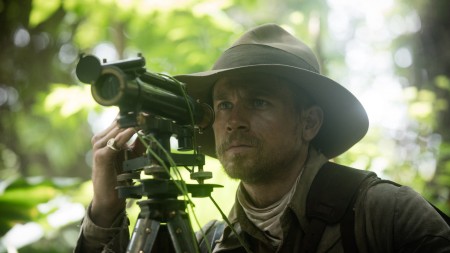
CHARLIE HUNNAM AS PERCY FAWCETT
Intrepid
For fans of James Gray and of Charlie Hunnam, of which I am both, The Lost City of Z - pronounced "zed," because the characters are British - is a thrill and a treat. It's something wholly new for Gray; you'd hardly expect it, though he went into costume-land for his last film, The Immigrant. British explorer Percy Fawcett may be Charlie Hunnam's most challenging role. This is a throwback to the good old adventure movies. It's about pursuing a dream, and entering the unknown. It's a story of a man seeking to redeem himself (his posh father was a gambler and a drunk). He explores the Amazonian river forests, 1906-1925, with a noble performance as an officer in trench warfare in Flanders in WWI, in the middle. Perhaps most importantly, he and his eldest son Jack (in grownup form played by the new "Spider Man" Tom Holland), who was then 22 (his father 56), disappeared, never to be found, lost in the forest, when all eyes were upon them, at a time of great excitement about explorations.
Let's set aside right away the issue of whether this is "true" or not. It should be obvious Percy Fawcett is an impossibly idealized figure, and a little embarrassing that John Hemming (who's now 82), a more recent and no doubt more extensive and successful Amazonian explorer and chronicler of Brazilian natives, should go out of his way to attack and debunk the man. His article in The Spectator is called "The Lost City of Z is a very long way from a true story — and I should know." Hemming, director of the Royal Geographical Society (a key player in the film) for over twenty years, has written eleven books on the Amazon, and probably had some pretty hairy adventures. But he has the misfortune not to have been lost when many thousand newspaper readers were following his reports. Hemming's attack sounds mean spirited and is clueless.
When Hemming in the article calls the real Percy Fawcett "a surveyor who never discovered anything, a nutter, a racist," and "incompetent," it makes him sound as angry and jealous as the movie's only real villain (but a big one), James Murray (Angus Macfadyen), an aging, overweight Shackleton expedition member who comes along with Fawcett with his regular teammates Henry Costin (Robert Pattinson) and Edward Ashley (Arthur Manley) and sabotages the venture through his incompetence and makes a lot of trouble for Fawcett when they return to London.
James Gray's version of Percy Fawcett, embodied by the handsome, charismatic, soft-spoken Hunnam, and based by Gray on a book by the journalist David Gramm (differences between the book, facts, and film are outlined in a Time summary by Eliza Bermann), is an ideal from another era. His effort to restore the family name is noble, though then his obsession with finding a lost civilization leaves that behind and also wipes out his own limited finances already squandered by his father. He is a dreamer (and follower of the occultist Madame Blavatsky). He is much away from family, but duty and passion are the reasons. His relations with his strong wife Nina (a terrific Sienna Miller) never deteriorate because their love is strong. There's conflict with his older son Jack, but that's warmly resolved as they become collaborators. This is a story about moral values.
Percy Fawcett is intrepid and brave. He may have had some racist ideas (rampant at the time of course), downplayed here. The idealized portrait is old-fashioned too. But the protagonist is complex enough so that doesn't seem false.
The strength of Gray's screenplay is in its portrait of a life that was met with failure and yet was exemplary, the way it makes the public and private life, the family passions and the life-threatening experiences in the jungle and on the battlefield, always equally important and equally interesting. There is so much balance that it can make this somewhat long movie seem perhaps a bit blah. But one must stop and think. Obviously Percy Fawcett is a figure to be admired for who he is, not what he accomplishes. That's the beauty of the movie. Old fashioned it is, but not in providing conventional payoffs. Gray does not compromise here to do something more "mainstream" - already in earlier films like The Yards and We Own the Night Gray belied the distinction between mainstream and auteur. He never does things in the expected way. This is helped by the cinematography of Darius Khondji, shot on film, of course (Gray is a passionate advocate). Scenes are rich and dark but not conventionally beautiful. Nothing is ever too brightly lit. Framing of river and jungle is often surprising, unexpected. The last hours of Jack and Percy - or the last moments when we, the viewers, get to see them - are the most adventurous staging and filming, dreamlike and beautiful. The tribal elder says (in subtitles) "This white Christian is not one of us. But he is not one of them either. We must find his spirit a home."
The Lost City of Z, 141 mins., debuted at the New York Film Festival 15 Oct. 2016; also at Berlin, Wisconsin, Cleveland, RiverRun and San Francisco. US theatrical release 14 Apr. 2017; wider 21 Apr.
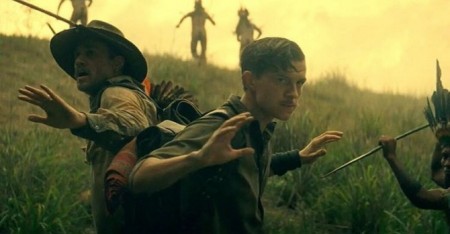
CHARLIE HUNNAM AND TOM HOLLAND IN THE LOST CITY OF Z
Last edited by Chris Knipp; 04-21-2017 at 07:50 PM.
-
THE SON OF JOSEPH/LE FILMS DE JOSEPH (Eugène Green 2016)
EUGÈNE GREEN: THE SON OF JOSEPH/LE FILS DE JOSEPH (2016)

FABRIZIO RONGIONE, VICTOR EZENFIS IN THE SON OF JOSEPH
A warm fable about birth and parenthood
This newer film by Eugène Green, while still in his signature stilted, artificial style, works much, much better for me than his previous one, La Sapienza (NYFF 2014) perhaps because it is about a boy. It's officially about "Nativity," and ends with a Mary, a Joseph, and an ass, followed by the son, Vincent, the teenager whose search and pursuit the story's all about. The lectures about failed marriage and baroque architecture in La Sapienza failed to engage me despite its beautiful accompanying images and Lake Maggiore scenery. This time we're not in the Italian lake country, but right in Paris, in the 3rd arrondissement: that's an advantage, too. These are home places and home feelings and basic things, and the formalized, slightly static action (spoken with respect for every vowel sound and all the liaisons) is serious and intense, dangerous too, though also frivolous and light and jokey.
Vincent, 17 (Victor Ezenfis, an appealing newcomer, who can do raw anger and puckish humor equally well), is a sullen lycée student, mean to his kind and loving mother, Marie (Natacha Régnier), a nurse, hating everyone, rejecting the cruel and exploitative plans of several classmates early on. He no longer accepts her assertions that he has no father and breaks into her desk and finds a name. This leads him to Oscar Pormenor (Matthieu Alalric), an absolute heel, and a highly successful publisher in the center of a snobbish, absurd literary world Vincent glimpses at a cocktail party, and at Pormenor's offices at the Hotel Cluny, spying on his misbehavior with a secretary from under a divan and later menacing him and running away.
In his flight he immediately runs into the hotel bar and finds Oscar's no-account brother, Joseph (Fabrizio Rongione, also in La Sapienza)), who's just appealed unsuccessfully to Oscar for funds to raise cows in their native Normandy. Joseph and Vincent strike up an instant bond. As well as a love of corny puns mocking the bourgeoisie, it's also clear that Vincent has an instinctive sense of good and evil, which he can detect equally well in animals or in humans. And Green can mock modern things, as with the two cell-phone users who run into each other on the street early on. How retro is Green? In person would he be a meany and a scold? It seems not, given the benevolent good humor he projects with his fuzzy hair and brush mustache in his cameo as the hotel's receptionist.
The film is structured via Christian myth into five chapters, The Sacrifice of Abraham, The Golden Calf, The Sacrifice of Isaac (Vincent has a large reproduction of Caravaggio's painting of that event on his bedroom wall), The Carpenter, and The Flight to Egypt - which as Richard Brody puts it in his admiring and informative review, "distill Biblical mythology into a grand and overarching drama of fathers and sons." There is also forgiveness, if not repentance. But what Vincent is doing in this movie, if too serious and risky to call it a lark, still is an adventure, and there's a continual element of play. As usual there is baroque music, here both recitation and singing in a church.
Eugène Green left New York at 23, rejecting America as a barbarian place, studied arts and letters extensively in Paris, became a French citizen at 29, and at 30, the same year he was an extra on Robert Bresson's The Devil, Probably, started the Théâtre de la Sapience, promoting baroque theater and baroque diction. After 20 years of this he switched to film, though he has still put on performances of Racine and Bossuet in churches. His orientation is Christian and moral. His films, which early on drew the favor of Jean-Luc Godard, show an influence of Bresson in the way characters are framed in closeup, centered, addressing the camera directly, to which Mike D'Angelo has attributed an effect of "pure, unconditional compassion" as powerful as the lethal one of "Madame Psychosis" in David Foster Wallace's Infinite Jest. But D'Angelo held back from making this one of his year's favorites for its "implicitly reactionary viewpoint on single motherhood" and Vincent's "asshole" behavior toward his mother. Aren't these just aspects of the film's rigor and its Christianity? It may be not single motherhood that's worried about but loneliness. Vincent's fixing his mom up with his new best friend and mentor is a heavenly gesture.
This film, Eugène Green's most appealing and accessible by all accounts (I've seen only the two), affirms fatherhood and family and moral responsibility in Christian-inspired terms in a light hearted fable with a touching finale that evokes the manners and outlooks of Bresson, Wes Anderson, Manoel de Oliveira, and above all Green, his sometimes stiff, aesthetic style this time turned warm and humorous. Let's not forget that the ultra-humanistic Dardenne brothers were also influenced by Bresson, and they are coproducers of this film.
The Son of Joseph/Le fils de Joseph, 113 mins., debuted 12 Feb. 2016 at Berlin; at least a dozen other international festivals including the NYFF (Oct. 2016), London, Torino, Karlovy and Melbourne. French release 20 Apr. 2016 to rave reviews (AlloCinee press rating 3.9). US limited theatrical release 13 Jan. 2017. Viewed on Netflix Streaming USA 27 Aug. 2017.
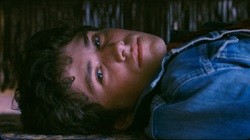
Hiding under the sofa
Last edited by Chris Knipp; 08-29-2017 at 12:02 AM.
-
YOURSELF AND YOURS 당신자신과 당신의 것 (Hong Sang-soo 2016)
HONG SANG-SOO: YOURSELF AND YOURS 당신자신과 당신의 것 (2016)
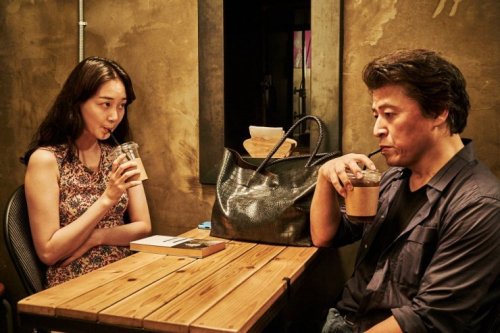
LEE YOO-YOUNG AND KIM JU-HYUK IN YOURSELF AND YOURS
Watch on virtual cinemas. Alcohol and love infuse “Yourself and Yours,” a new movie from the South Korean filmmaker Hong Sang-soo. It kicks off with a breakup: Young-soo (Kim Ju-hyuk) tells Min-jung (Lee Yoo-young), his girlfriend, to quit drinking. She quits him instead. The plot that follows involves mystery and despondency. “Hong’s formal confidence yields a movie that’s very simply constructed and utterly engrossing,” Glenn Kenny wrote in his review for The New York Times. He named the film a Critic’s Pick. “There are a lot of scenes done in a single shot, usually static, but when there’s a zoom (his preferred camera flourish), it’s unfussy and direct,” Kenny wrote. “He puts you in tune with the world of his sad-sack characters immediately, and their rhythm becomes the rhythm of the story.” The film was released overseas in 2016, but is just now having its stateside debut; it’s available this weekend from many virtual cinemas, including Film at Lincoln Center’s. A Cinema Guild release.
Last edited by Chris Knipp; 06-10-2020 at 05:18 PM.
 Posting Permissions
Posting Permissions
- You may not post new threads
- You may not post replies
- You may not post attachments
- You may not edit your posts
-
Forum Rules





 Reply With Quote
Reply With Quote

















Bookmarks